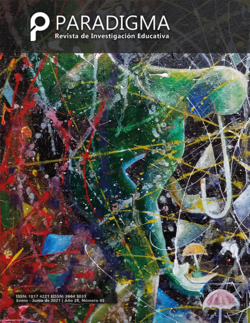Level of Development of Mathematical Competencies in Second Year Students of the UPNFM Mathematics Teacher’s Degree Program
DOI:
https://doi.org/10.5377/paradigma.v28i45.11739Keywords:
mathematical competencies, mathematical thinking, competency development levelAbstract
The purpose of this article is to show the results obtained through research on the level of development of mathematical competencies in second year students of the Mathematics Teacher Training Program at UPNFM. The methodology was developed under a mixed approach based on the qualitative-quantitative complementarity of data. For the design of the mathematical competencies evaluation model, the theoretical framework of PISA 2006 was taken as a reference, where the competencies were operationalized by establishing categories of analysis and descriptors according to the levels of achievement of the competency. The results show that students’ best performance was achieved in the competencies of reasoning and argumentation and problem posing and solving. The competencies with the lowest levels of achievement are communication and representation. The least developed levels of competencies are shown in the development of tasks that demand autonomous thinking and creativity.
Downloads
490
Downloads
Published
How to Cite
Issue
Section
License
Transfer of Copyright
- The author, when sending the work, states that it is his will to give the Universidad Pedagógica Nacional Francisco Morazán the patrimonial rights that correspond to him as the author of his work.
- The rights here assigned include all economic rights (Reproduction, transformation, public communication and distribution) and are given without limitation in terms of territory; This Assignment is given for the entire duration term established in the current legislation in Honduras.
- The cession of the aforementioned rights does not imply the cession of moral rights over it, because in accordance with the provisions of the Copyright and Related Rights Law, Chapter II, of the Moral Rights, Article 34, Article 25 , these rights are inalienable, imprescriptible, indefeasible and inalienable.
- The research work or document must be original and have been done without violating or usurping rights of third parties, therefore, the work is exclusively authored and owns the same.
- In the case of any claim or action by a third party, as to copyright on the work in question, the author must assume full responsibility for the rights assigned.
- Upon completion of the Rights Assignment Form, the author states that the work has not been published in another way, that the rights on the work have not been assigned and that no encumbrance or limitation on their use or use is imposed on them.





